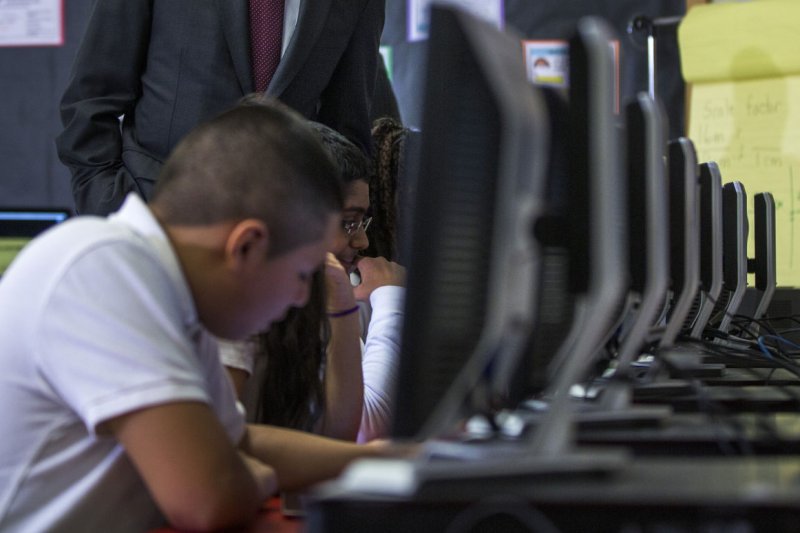A new study finds that students who frequent a computer most during class time tend to perform worse on math, science and reading assessments. File photo by UPI/Jim Lo Scalzo |
License Photo
PARIS, Sept. 15 (UPI) -- Technology in the classroom: a panacea for educational shortcomings or false hope?
New analysis by researchers at the Organisation for Economic Co-operation and Development suggests school computers have been more of the latter than the former.
According to a global study by the international organization, the use of technology failed to improve academic outcomes and was, in some instances, linked with diminished student performance.
The new study compared trends in national spending on school technology and school performance. Performance was measured using the Programme for International Student Assessment, or PISA test -- an assessment developed by OECD to measure scholastic performance in the subjects of math, science and reading. The tests, which have been administered since 2000, are taken by 15-year-olds in more than 70 countries.
Researchers found no link between spending on information and communication technology (ICT) devices and academic performance.
"The results also show no appreciable improvements in student achievement in reading, mathematics or science in the countries that had invested heavily in ICT for education," Andreas Schleicher, director of the OECD, wrote in the foreword of the new study.
"And perhaps the most disappointing finding of the report is that technology is of little help in bridging the skills divide between advantaged and disadvantaged students."
When researchers broke it down further, looking at survey results of time spent using classroom technology, they found students who used computers frequently tended to score lower on PISA exams.
The study's authors acknowledge that moderate computer-users tend do moderately better academically than do students who rarely use computers. But Schleicher says his organization's paper is proof that education reformers need new strategies for delivering technology's potential to pupils all over the world.
"School systems need to find more effective ways to integrate | technology into teaching and learning to provide educators with learning environments that support 21st century pedagogies and provide children with the 21st century skills they need to succeed in tomorrow's world," he said in a press release. "Technology is the only way to dramatically expand access to knowledge. To deliver on the promises technology holds, countries need to invest more effectively and ensure that teachers are at the forefront of designing and implementing this change."
In the United States, technology has often been sold as a way to close the performance gap between black students and white students, poor students and affluent students. But while the gap between black and white student performance has closed, technology has failed to slow the widening gap between disadvantaged pupils and their wealthier peers.
"And perhaps the most disappointing finding of the report is that technology is of little help in bridging the skills divide between advantaged and disadvantaged students," Schleicher wrote.















